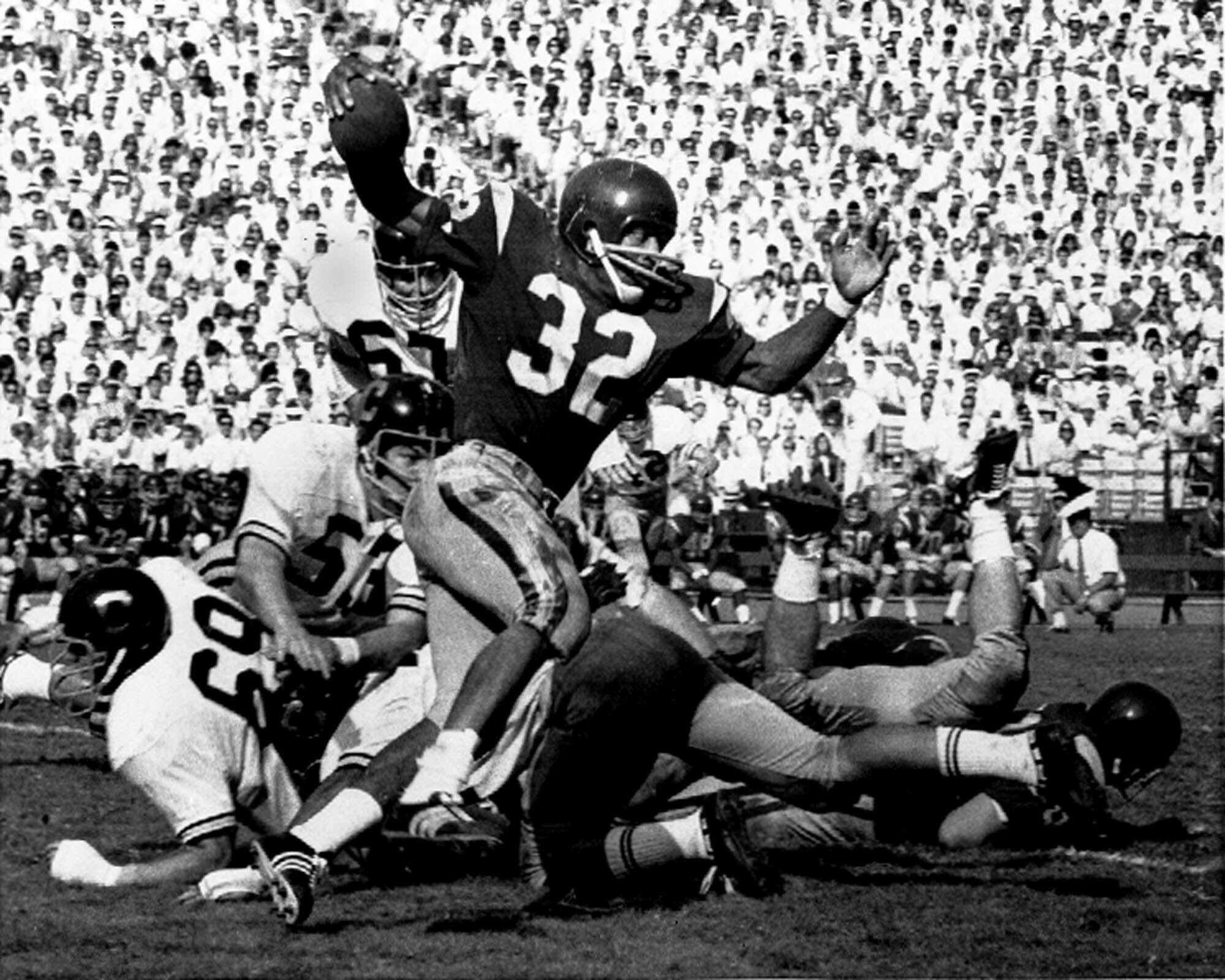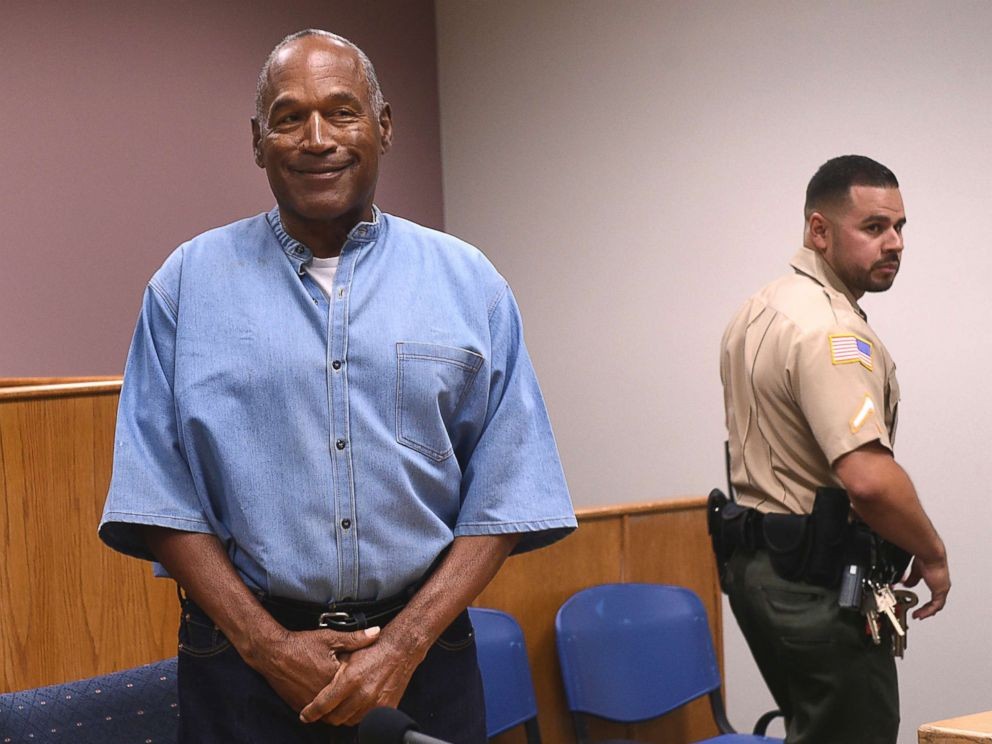Why did O.J. Simpson go to prison is a question that has lingered in the minds of many, transcending generations and sparking continuous debate. At WHY.EDU.VN, we delve into this complex legal saga, providing clarity and understanding through meticulous research and expert analysis. Explore the depths of this infamous case and gain insights into the events that led to his incarceration, including key facts, figures, and related legal proceedings. Uncover the reasons for his imprisonment and examine the legal and social implications of this landmark case by reading expert analyses and viewing exclusive multimedia content.
1. The O.J. Simpson Saga: A Nation Gripped
Orenthal James “O.J.” Simpson, a name once synonymous with football glory and Hollywood charm, became entangled in one of the most sensational legal dramas in American history. To understand why O.J. Simpson ended up in prison, it’s essential to revisit the key events that shaped his life and the subsequent trials that captivated the world.
1.1 From Football Hero to Suspect
Simpson rose to fame as a star running back for the University of Southern California (USC) in the 1960s, winning the Heisman Trophy in 1968. His success continued in the NFL, where he played for the Buffalo Bills and became the first player to rush for over 2,000 yards in a single season in 1973. After retiring from football, Simpson transitioned to acting, appearing in movies like “The Naked Gun” series and becoming a familiar face in Hertz commercials.
However, Simpson’s life took a dark turn on June 12, 1994, when his ex-wife, Nicole Brown Simpson, and her friend, Ronald Goldman, were found murdered outside her Los Angeles home. The brutal nature of the crime and Simpson’s immediate implication transformed him from a beloved celebrity into a prime suspect.
1.2 The “Trial of the Century”
The criminal trial of O.J. Simpson in 1995 was a media spectacle, drawing intense public interest. Simpson was charged with two counts of first-degree murder. The prosecution presented evidence including blood samples found at the crime scene and in Simpson’s Ford Bronco, suggesting his guilt.
_1_4x3_992.jpg)
However, the defense team, led by prominent attorneys like Johnnie Cochran, raised doubts about the integrity of the police investigation and the handling of evidence. Cochran famously argued, “If it doesn’t fit, you must acquit,” referring to the bloody gloves found at the crime scene that Simpson struggled to put on during the trial.
On October 3, 1995, the jury acquitted Simpson of all criminal charges. The verdict was met with shock and disbelief by many, sparking intense debate about race, justice, and the American legal system.
1.3 Civil Trial and Liability
Despite the acquittal in the criminal trial, the families of Nicole Brown Simpson and Ronald Goldman pursued a civil lawsuit against Simpson for wrongful death. In 1997, a civil jury found Simpson liable for the deaths and ordered him to pay $33.5 million in damages. While the civil trial established Simpson’s responsibility for the deaths, it did not result in imprisonment.
2. The Las Vegas Incident: The Road to Incarceration
The question of “Why did O.J. Simpson go to prison” is not answered by the infamous 1995 trial. The criminal acquittal and the civil case damages do not directly answer “Why did O.J. Simpson go to prison”. The key to understanding Simpson’s imprisonment lies in an incident that occurred more than a decade later in Las Vegas.
2.1 The Confrontation at the Palace Station Hotel
In September 2007, Simpson and a group of men confronted memorabilia dealers in a room at the Palace Station Hotel in Las Vegas. Simpson claimed that the dealers were selling sports memorabilia that belonged to him, including items from his football career.
According to court documents and testimonies, Simpson and his associates entered the hotel room, and a confrontation ensued. Weapons were allegedly brandished, and memorabilia was taken from the dealers. Simpson maintained that he only wanted to retrieve his personal belongings and did not intend to commit a crime.
2.2 Arrest and Charges
Following the incident, Simpson was arrested and charged with multiple felony counts, including:
- Kidnapping
- Armed Robbery
- Conspiracy
- Assault with a Deadly Weapon
The charges stemmed from allegations that Simpson and his associates had forcibly confined the memorabilia dealers and used weapons during the confrontation.
2.3 The Trial and Conviction
The trial for the Las Vegas incident took place in 2008. The prosecution presented evidence and testimonies portraying Simpson as the leader of a premeditated robbery. The defense argued that Simpson was merely trying to recover his stolen property and that no serious harm was intended.
After a lengthy trial, the jury found Simpson guilty on all counts. The conviction marked a significant turning point in Simpson’s life, leading to his imprisonment.
2.4 Sentencing and Imprisonment
In December 2008, Simpson was sentenced to a prison term of 9 to 33 years. Judge Jackie Glass, during the sentencing, stated that Simpson’s actions were reckless and that he had broken the law. Simpson was incarcerated at the Lovelock Correctional Center in Nevada.
The sentencing reflected the severity of the charges and the court’s determination to hold Simpson accountable for his actions in the Las Vegas incident.
3. Legal Analysis: Why the Las Vegas Case Led to Prison
The conviction in the Las Vegas case provides the direct answer to “Why did O.J. Simpson go to prison.” But understanding the legal factors that contributed to this outcome requires a detailed analysis of the charges, evidence, and legal strategies employed during the trial.
3.1 The Weight of Evidence
The prosecution in the Las Vegas case presented a substantial amount of evidence, including witness testimonies, audio recordings, and physical evidence from the hotel room. This evidence painted a picture of Simpson as the leader of a group that used force and intimidation to take property from the memorabilia dealers.
3.2 The Impact of Prior Acquittal
It’s important to consider whether Simpson’s prior acquittal in the murder trial influenced the jury’s perception of him in the Las Vegas case. While the two cases were legally distinct, the notoriety and public perception surrounding Simpson may have played a role in the jury’s decision-making process.
3.3 The Role of Intent
A key element in the charges against Simpson was his intent during the Las Vegas incident. The prosecution argued that Simpson intended to commit robbery and kidnapping, while the defense claimed that he only wanted to retrieve his personal belongings.
The jury ultimately concluded that Simpson acted with criminal intent, leading to his conviction on the felony charges.
3.4 The Sentencing Discretion
The judge in the Las Vegas case had significant discretion in determining Simpson’s sentence. The sentence of 9 to 33 years reflected the severity of the charges and the judge’s assessment of Simpson’s culpability.
The sentencing decision was also influenced by the judge’s perception of Simpson’s arrogance and lack of remorse for his actions.
4. Public Reaction and Media Coverage
The O.J. Simpson case has been a constant subject of public discussion and media attention. The Las Vegas incident and subsequent trial were no exception.
4.1 Media Frenzy
The media coverage of the Las Vegas case was extensive, with news outlets providing minute-by-minute updates on the trial proceedings. The public was once again captivated by the legal drama surrounding O.J. Simpson.
4.2 Public Opinion
Public opinion on the Las Vegas case was divided, with some believing that Simpson was finally being held accountable for his past actions, while others argued that he was being unfairly targeted due to his notoriety.
4.3 Social Commentary
The O.J. Simpson case has served as a platform for social commentary on issues such as race, justice, and celebrity culture. The Las Vegas incident and trial reignited these discussions and raised questions about the fairness of the legal system.
5. Life in Prison and Parole
After being sentenced, O.J. Simpson spent several years in prison. His time behind bars was marked by legal challenges and adjustments to a new reality.
5.1 Adapting to Prison Life
Reports from prison indicated that Simpson attempted to adapt to his new environment. He participated in some prison activities and maintained contact with his family.
5.2 Legal Appeals
Simpson’s legal team filed appeals challenging his conviction and sentence. However, these appeals were largely unsuccessful.
5.3 Parole Hearing
In 2017, Simpson became eligible for parole. At the parole hearing, he expressed remorse for his actions and stated that he had learned from his mistakes.
5.4 Parole Granted
The parole board granted Simpson parole, setting his release date for October 1, 2017. The decision was based on his good behavior in prison and his demonstration of rehabilitation.
6. Release and Later Life
O.J. Simpson was released from prison on October 1, 2017, after serving nine years for the Las Vegas incident. His release marked the end of one chapter in his life, but his story continued to attract public attention.
6.1 Life After Prison
After his release, Simpson initially resided in Nevada. He maintained a relatively low profile, but his activities were still followed by the media.
6.2 Social Media Presence
Simpson joined social media platforms like Twitter, where he occasionally commented on current events. His posts generated both interest and controversy.
6.3 Death
O.J. Simpson died on April 10, 2024, after battling cancer. His death brought an end to a life marked by both extraordinary achievement and profound controversy.
7. Conclusion: Reflecting on O.J. Simpson’s Legal Journey
The story of O.J. Simpson is a complex and multifaceted narrative that spans decades. From his rise to fame as a football star to his entanglement in one of the most sensational legal dramas in American history, Simpson’s life has been a subject of intense public interest and debate.
The answer to the question of why O.J. Simpson went to prison lies in the Las Vegas incident of 2007, which led to his conviction on multiple felony charges and a prison sentence of 9 to 33 years. While Simpson’s prior acquittal in the murder trial and the civil case damages had a huge impact, these did not directly answer “Why did O.J. Simpson go to prison”.
Simpson’s legal journey serves as a reminder of the complexities of the justice system and the impact of public perception on legal proceedings. His story also raises important questions about race, celebrity, and the pursuit of justice in America.
Understanding the O.J. Simpson case requires a comprehensive analysis of the facts, legal arguments, and social context surrounding the events. At WHY.EDU.VN, we are committed to providing our readers with accurate, in-depth information and expert analysis on complex legal issues.
8. FAQ: Unveiling More About O.J. Simpson’s Imprisonment
To further clarify the circumstances surrounding O.J. Simpson’s imprisonment, here are some frequently asked questions:
Q1: What specific charges led to O.J. Simpson’s imprisonment?
A: O.J. Simpson was imprisoned due to his conviction on multiple felony charges stemming from the Las Vegas incident in 2007. These charges included kidnapping, armed robbery, conspiracy, and assault with a deadly weapon.
Q2: How long was O.J. Simpson sentenced to prison?
A: Simpson was sentenced to a prison term of 9 to 33 years for his role in the Las Vegas incident.
Q3: Where was O.J. Simpson incarcerated?
A: O.J. Simpson was incarcerated at the Lovelock Correctional Center in Nevada.
Q4: When was O.J. Simpson granted parole?
A: O.J. Simpson was granted parole in July 2017, with his release date set for October 1, 2017.
Q5: What were the conditions of O.J. Simpson’s parole?
A: The conditions of Simpson’s parole included maintaining good behavior, avoiding contact with convicted felons, and participating in counseling programs.
Q6: Did O.J. Simpson admit guilt for the Las Vegas incident?
A: While Simpson expressed remorse for his actions during his parole hearing, he maintained that he only wanted to retrieve his personal belongings and did not intend to commit a crime.
Q7: How did O.J. Simpson spend his time in prison?
A: Reports indicate that Simpson attempted to adapt to prison life by participating in some prison activities and maintaining contact with his family.
Q8: Did O.J. Simpson’s prior acquittal in the murder trial affect the Las Vegas case?
A: While the two cases were legally distinct, the notoriety and public perception surrounding Simpson may have influenced the jury’s perception of him in the Las Vegas case.
Q9: What was the public reaction to O.J. Simpson’s imprisonment?
A: Public opinion on Simpson’s imprisonment was divided, with some believing that he was finally being held accountable for his actions, while others argued that he was being unfairly targeted due to his notoriety.
Q10: What is the significance of the O.J. Simpson case in American legal history?
A: The O.J. Simpson case is significant because it highlights the complexities of the justice system and the impact of public perception on legal proceedings. It also raises important questions about race, celebrity, and the pursuit of justice in America.
9. Deep Dive: The Key Players in the O.J. Simpson Saga
Understanding the O.J. Simpson case requires familiarity with the key individuals involved. Here’s a brief overview of some of the most important figures:
| Name | Role |
|---|---|
| O.J. Simpson | Former football star and actor, defendant in both the criminal and civil trials. |
| Nicole Brown Simpson | O.J. Simpson’s ex-wife, victim in the double homicide. |
| Ronald Goldman | Waiter and friend of Nicole Brown Simpson, also a victim in the double homicide. |
| Johnnie Cochran | Lead defense attorney for O.J. Simpson in the criminal trial. |
| Marcia Clark | Lead prosecutor in the criminal trial against O.J. Simpson. |
| Judge Jackie Glass | Judge who presided over O.J. Simpson’s trial for the Las Vegas incident. |
| Al Cowlings | Friend of O.J. Simpson, driver of the white Ford Bronco during the infamous police chase. |
| Fred Goldman | Father of Ronald Goldman, pursued a civil lawsuit against O.J. Simpson for his son’s wrongful death. |



10. Explore More Insights at WHY.EDU.VN
Do you have more questions about the O.J. Simpson case or other complex legal issues? At WHY.EDU.VN, we provide detailed answers and expert insights to help you understand the world around you. Our team of experienced researchers and legal analysts is dedicated to providing accurate, reliable information on a wide range of topics.
10.1 Ask Your Questions
If you have a specific question or topic you’d like us to cover, don’t hesitate to reach out. Our platform is designed to connect you with experts who can provide the answers you need. Visit WHY.EDU.VN today to explore our vast library of articles and resources.
10.2 Connect With Us
Stay up-to-date with the latest insights and analysis by following us on social media. Join our community of curious minds and engage in thoughtful discussions about the issues that matter most.
Contact Information:
- Address: 101 Curiosity Lane, Answer Town, CA 90210, United States
- WhatsApp: +1 (213) 555-0101
- Website: WHY.EDU.VN
At WHY.EDU.VN, we believe that knowledge is power. Let us help you unlock the answers you seek and empower you with the information you need to make informed decisions. Whether you’re a student, a professional, or simply a curious individual, we’re here to provide the answers you’re looking for. Visit why.edu.vn today and start your journey of discovery!